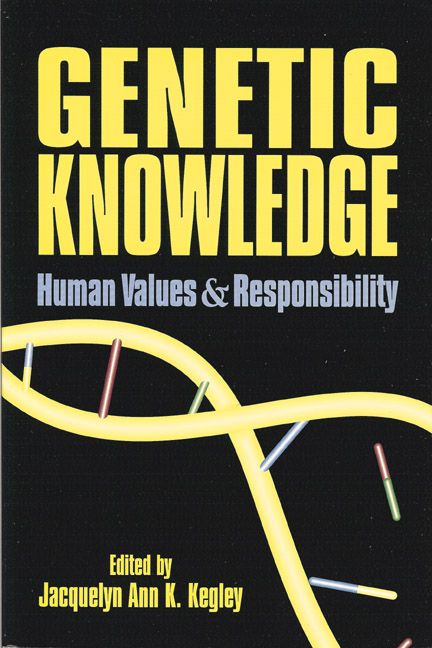“Provides both an introduction and survey of the immensely important field of genetics and the global problems–scientific, cultural, political, and moral that are coming from these developments The conclusions are ones of caution, urgency, and intelligent search for responsibility. Indications are that a vast reorientation of human self-determination is happening.”–Richard Gelwick, Chair of Medical Humanities and Behavioral Medicine, University of New England
Recent developments in the science of genetics and certain accompanying technologies such as genetic screening techniques and gene therapy present great promise for the prevention and possible cure of “genetic-based” diseases. However, genetic science is still at the frontier in gaining knowledge about gene mechanisms and manifestations and there are many uncertainties associated with any application of genetic technologies in the human context. There is, in fact, mounting evidence that any deterministic, linear, and unique causality model is inadequate to the complexity and flexibility of human genetic mechanisms. The general lack of understanding by the public and the tendency to great over-expectation concerning the promise of genetic technologies makes the ethical and public policy issues surrounding the use of genetic knowledge of crucial importance.
The volume addresses the many value, scientific, and public policy issues surrounding the use of genetic knowledge. Important questions are raised about the definitions of “health” and “disease”; “personhood” and “family.” Ethical and legal issues concerning individual right and responsibility versus communal good and responsibility; concerning discrimination, stigmatization and the right of privacy are discussed. Issues include ethic and ethos of responsibility such as the notion of responsible, preventive medicine; genetic carrier responsibility, responsibility for family and for future generations. The perspective is interdisciplinary and multi-cultural.
Table of Contents
Introduction
Genetic Information: Caution, Cooperation, and Human Values
Jacquelyn Ann K. Kegley
Section I: The Present State of Genetic Knowledge: What We Know
and What We Do Not
Know
The Human Genome: Facts, Enigmas, and Complexities
Guido Pincheira
The Nature of Polygenic Diseases: Toward a Holistic Theory of Biology
R. C. Strohman
Section II: The Concepts of “Genetic Health” and “Genetic Disease”:
Do They Make Sense?
Genetic Information and Genetic Essentialism: Will We Betray Science,
the Individual, and the
Community?
Jacquelyn Ann K. Kegley
Reductionism in Medicine?: Genetification of Concepts of Health
and Disease?
Hans-Martin Sass
Treatment of Genetic Disease: Who is the Patient?
Darren Shickle
Section III: The Present State of Genetic Knowledge and Its Implications
for Health Care
The Present State of Genetic Knowledge and Implications for Genetic
Screening
Verle Headings
Genetic Knowledge and Human Values: A Clinician’s View
Rita Kielstein
Section IV: Genetic Knowledge Viewed from Ethnic, Cultural, and
Religious Perspectives
Amniocentesis and Gender Discrimination in India
Kusum Kumar
A Chinese Perspective on the Use of Genetic Knowledge
Renzong Qiu & Xinhe Hu
Genetic Screening, Sickle Cell Anemia, and the African and African-American
Perspectives: The
Ethics of Screening and Counseling
Segan Gbadegesin
Islamic Perspectives on Genetic Technology and Information Use
Gamal I. Serour.
Section V: Public Policy for Genetic Knowledge and Its Use
Public Policy Issues: Genetic Knowledge and Its Use
Robert Blank
Legal Implications of Genetic Screening and Counseling
Jacquelyn K. Phlegar and Theodore C. Phlegar
List of Contributors
Bibliography
Glossary of Genetic Terms
Index
DR. JACQUELYN ANN K. KEGLEY is Professor of Philosophy at California State University, Bakersfield, where she was named CSUB outstanding professor and the CSU system-wide professor in 1988. She received the University Leadership and Service Award in 1997. Dr. Kegley has lectured and presented material at International Conferences and has published over forty articles, edited three books, co-authored An Introduction to Logic, and authored Genuine Individuals and Genuine Communities (Vanderbilt University Press, 1997).






